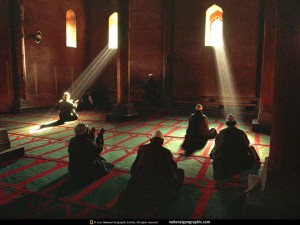On Wednesday, March 30, Students for Interfaith Action, along with the M.K. Gandhi Institute and the Muslim Student Association, organized a panel for personal reflection and political discussion about Islamophobia. The panel was mediated by Take Five Scholar Lubaba Hasan, and consisted of three non-Muslim and two Muslim panelists: Seniors Maya Dukmasova, James Eles and JJ Gonzalez, Chaplain for the Muslim Students’ Association Brother Rashid Muhammad and alumnus Omer Ropri. The participation of students whose programs incorporate Islamic studies reflected growing intellectual inquiry about Islam on the UR campus.
Eles, who will study the history of war codes in a Take Five year, provided historical insight into Islamophobia during the Middle Ages. He discussed how European perceptions of Islam and Muslims aided in waging war against “the Orient” during the Crusades, arguing that perhaps such a history has informed current misconceptions about Islam.
Gonzalez and Dukmasova, on the other hand, focused their discussion on contemporary portrayals of Islam and the War on Terror in the media. Gonzalez argued that the pervasive associations between Islam and “terror” in the mainstream media activates fear and irrationality in the American public, which grew after 9/11 and the invasions of Iraq and Afghanistan that followed. He explained that the second Bush administration exploited Islamophobia to gain popular support for the War on Terror. Dukmasova expanded on this further, discussing how the media used representations of oppressed Muslim women to justify the war in Afghanistan. She explained that images that portrayed Afghan society as “backwards” and stories about preventing education for women permeated the American media as the U.S. was invading Afghanistan. Quoting excerpts from an article entitled, “Do Muslim Women Really Need Saving?,” by Lila Abu-Lughod, Dukmasova argued that the media’s obsession with the plight of Muslim women illustrates how gender issues are used to inform or misinform the American public about conflicts in the Muslim world.
On a more personal note, Ropri and Brother Rashid reflected on their perceptions of Islamophobia through their experiences as Muslims in the United States. Ropri noted that upon emigrating from Pakistan at age 11, “My entire experience in the U.S. has been affected by Sept. 11.” He advocated for exchange and dialogue between Muslims and non-Muslim Americans to educate the American public about Islam and its teachings.
In addition to advocating for open discussions about the Islamic faith, Brother Rashid also gave a unique perspective on Islamophobia. His reflection on his identity as a Muslim, an African-American and a retired military officer represented the diverse experiences of Muslims in the U.S. Brother Rashid noted that after having served to defend the U.S. Constitution for over 20 years, he believed Islamophobic attitudes to be “antithetical to our constitutional structure.”
He also stated, “Some of the same institutions that engendered bigotry towards African-Americans and other minorities are now rising up doing the same kinds of things in the situation of Islamophobia.” Brother Rashid suggested that while Islamophobia may seem like a recent phenomenon, it is critical that we understand it in terms of a much longer history of ethnic discrimination in the U.S.
Brother Rashid’s point, as well as others made throughout the discussion, reminds us that racism and Islamophobia do not only exist in the form of personal prejudice. State and non-state institutions perpetuate stereotypes through representations and political performances in order to bolster government agendas. As students and citizens, we should organize more discussions like this panel to look at these matters critically and, hopefully, demystify them.
Chinelli is a member of
the class of 2011.







